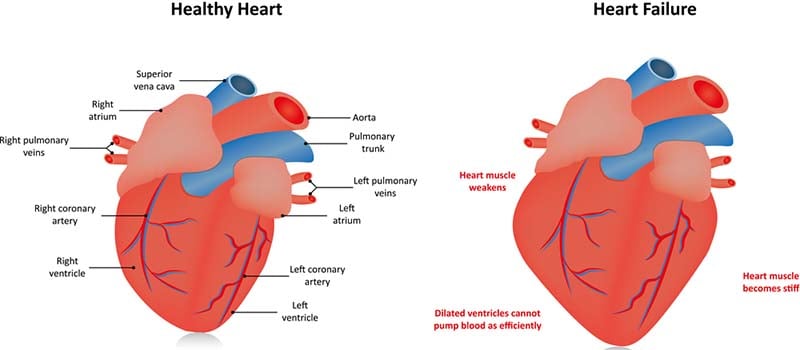4 Heart Problems in Dogs: Causes, Symptoms and Treatments
Dogs can suffer from a variety of heart problems. Some breeds were shown to be more at risk of heart related diseases. For example, studies show that small breeds are far more likely to develop heart issues like DMVD. Understanding causes and knowing signs of heart problems in dogs can help owners to prevent fatalities and speed up treatment.
Two Types of Heart Problems in Dogs
Dog heart problem can either be congenital, which is a term for health issues dogs are born with, or acquired, which are those that are caused by some external factors.
Congenital heart disease is caused by genetics but it doesn’t have to be hereditary. Dogs with congenital heart problems will usually develop symptoms at some point in their life. However, this can be delayed or even prevented with a healthy diet and regular exercise. Reducing stress can also help because stress contributes to early onset of congenital heart disease.
Acquired heart disease can include different types of heart problems but the most common ones are valvular and myocardial disease. Heart disease can also be caused by some infections, like heartworms and parvo. While the effects of these issues are pretty similar, the treatment can be very different.
Some recent studies show that dogs born in summer are at higher risk of heart disease.
Is Your Dog’s Breed at Risk?
All breeds – small and large dogs – can suffer from the below mentioned canine heart diseases, but certain breeds were found in retrospective studies with large samples to be more prone to these issues than others. Prevalence depends on the type of heart issue.
Large and giant breeds are more prone to conditions like enlarged heart or heart failure. Some of these breeds known to often have these problems are Boxers, Dobermans, German Shepherds, Rottweilers, Retrievers and Great Danes.
Small and toy breeds, on the other hand, are more susceptible to heart problems related to the heart valves, like Degenerative Mitral Valve Disease (DMVD). Some of these breeds include Spaniels, especially Cavalier King Charles Spaniels, Miniature and Toy Poodles, Dachshunds and Miniature Schnauzers.
Dog Food Causing Heart Problems in Dogs
Grain free dog food used to be considered healthier by pet owners. Even though this was never the conclusion of veterinarians, it’s only recently that pet owners began changing their dogs’ kibble after a University of California, Davis study found a link showing grain free dog food causing heart problems in dogs.
FDA grain free dog food heart problems report explained how this problem is related to taurine deficiency in dogs, an amino acid that’s crucial for a canine’s healthy heart. This is not news to scientists and veterinarians, who knew for decades that lack of taurine in a dog’s diet could lead to heart problems, and particularly to heart muscle disorder. Many dog food brands were consistently studied to ensure they provide enough taurine.
Grain free diets were always a fad that took off, but most dogs actually don’t need need to be fed such diets unless they specifically have an allergy to grains. Since the FDA’s investigation published in 2018, more research has been performed for exact causes and links between grain free dog foods and heart disease. A 2020 study suggests that taurine deficiency is caused by higher content of soluble fiber and oligosaccharides.
The bottom line on grain free dog food causing heart problems in dogs is that you can prevent such diseases by avoiding fad diets. If your dog does not require grain free food, then there is no reason to avoid it, since grains can actually be beneficial to dogs in more than one way.
4 Heart Problems in Dogs
1. Heartworm Disease
Heartworm disease is responsible for around 13% of heart diseases in dogs, even though it can be completely prevented with medications. Prevention is particularly important in areas with greater mosquito population since this parasitic infection is contracted through mosquito bites. However, heartworm disease has been diagnosed in all 50 US states.
Symptoms:
Heartworm disease is very serious and will be fatal if left untreated. While the disease can sometimes be asymptomatic, especially in the first stage, common symptoms include persistent cough, fatigue, decreased appetite and weight loss. In later stages dogs may cough blood.
Treatment:
Treating canine heartworm disease starts with the killing of the adult worms in the heart and arteries, along with larvae from the bloodstream. Your vet will administer heartworm medications, usually melarsomine via injections for adult worms and ivermectin for larvae. He may also prescribe antibiotics or steroids if needed, for more severe infections. Pain medications are often given to make the injections less painful.
2. Myocardial Disease
Myocardial disease is the type of heart disease that attacks the animal’s heart muscle and is thought to be responsible for 8% of all heart problems in dogs. There are different variations of this disease, but the most common one is called dilated cardiomyopathy (DCM). This disease is characterized by the enlarged heart that doesn’t work properly and it’s the one where grain free dog food was linked to be the cause of DCM.
Causes:
This condition is more prevalent in senior dogs, although the exact causes are largely unknown. Other than dog food causing DCM in dogs due to taurine deficiency, some evidence also suggests genetic predisposition, while other studies continue to point to the lack of taurine (and potentially carnitine) in a dog’s diet as a potential contributor to DCM in some breeds.
Symptoms:
The most notable symptoms of dilated cardiomyopathy in dogs includes rapid breathing, coughing, shortness of breath, lethargy, anorexia and abdominal distension. Some dogs might also suffer from transient loss of consciousness.
There can sometimes be fluid present in the lungs, which can cause your dog’s breathing to sound crackling or muffled. Some less noticeable symptoms of DCM can be spotted with a detailed physical examination of the heart.
Treatment:
Treatment for dilated cardiomyopathy is focused on improving the health of the heart and its function. Unfortunately, dogs with DCM usually have a poor prognosis and the goal is to make the rest of dog’s life as comfortable as possible.
Veterinarian will prescribe drugs to increase heart contraction and to improve your dog’s breathing. If there is accumulation of fluid in the lungs, your vet will prescribe diuretics as well. Drugs that enhance dilation of the blood vessels, called vasodilators, can make the heart pump blood more efficiently. Hospitalization is usually not required, except in severe cases.
Your vet will monitor your dog’s progress on regular checkups but you will also have to be alert and watch for any changes in your dog’s behavior and signs of further heart issues.
3. Valvular Disease
Valvular diseases are one of the most common forms of heart disease in dogs since they are responsible for around 70% of all heart problems. There are several subtypes of vulvular canine diseases, such as chronic valve disease (CVD), endocardiosis and Degenerative Mitral Valve Disease (DMVD), with CVD being more prevalent.
Causes:
Chronic valve disease is usually more prominent in dogs that are older than 5 years. It is also more likely for small breeds to develop this condition.
Basically, CVD is a degenerative process related to aging. There is no determined cause, although there is probably an inherited genetic component, at least in some breeds. While many dogs with dental disease also suffer from chronic valve disease, dental disease is not considered to be the cause of CVD.
Symptoms:
Some of the most common clinical signs of CVD include rapid and shallow breathing at rest, labored breathing, restless sleep, weakness, coughing, decreased appetite, weight loss and lethargy. Some dogs may experience fainting or collapse, as well as distended belly.
Treatment:
Unfortunately, currently there is no way to prevent or even slow down the progression of chronic valve disease in dogs. There are medications your vet may prescribe if your dog has symptomatic CVD, which is a more advanced stage of the condition. These medications can help him relieve the symptoms but they will not treat the disease itself.
Some lifestyle changes may be necessary if your dog suffers from CVD, especially diet changes. That includes feeding a balanced diet and avoiding excessive sodium. If your dog is overweight, he may have to go on a weight reduction program.
4. Congestive Heart Failure
Congestive heart failure (CHF) is not a disease itself but rather a stage in the development of other canine heart problems, especially chronic valve disease. It’s a term that describes the heart’s inability to pump enough blood to other organs and the rest of the body.
Causes:
It is estimated that most of the CHF cases are caused by valvular insufficiency. However, there are many other causes that lead to CHF, like cardiomyopathy, narrowing of major blood vessels and rhythm irregularities.
Symptoms:
Early symptoms of congestive heart failure in dogs are the same as other heart problems – breathing difficulty, coughing, tiring easily, increased respiratory rate, etc. However, with the progression of the disease other symptoms may appear, including fluid buildup in the abdomen, change in tongue or gum color to a shade of blue, weight loss and fainting.
Treatment:
Your dog’s treatment for congestive heart disease will depend on the specific heart problem that is causing it. Some of the possible treatment options include:
- Low-sodium diet to decrease fluid build-up in abdomen
- Drugs to slow down fluid build-up in the lungs
- Drugs that help the heart work better
- Surgery to repair a torn valve
- Installing a pacemaker for irregular heartbeat
In conclusion, a dog’s heart problems are always serious and recognizing the symptoms on time can help your pet’s prognosis and quality of life. Pay attention to various breathing problems such as shortness of breath and labored breathing, coughing, lethargy, poor appetite and weight loss. Take your pooch to the vet to get the proper diagnosis and start the treatment immediately.
READ NEXT: Homemade Dog Food for Heart Disease Recipe










zithromax 1000 mg pills – https://zithromax.pro/#
dark web sites links darkweb marketplace
dark net darkmarket
how to access dark web https://cypherdarkmarketplace.com/ tor marketplace
deep web links tor dark web
darknet websites tor markets 2023
Thanks for sharing your thoughts about Small Business Marketing.
Regards
Hey I am so grateful I found your blog, I really found you
by error, while I was researching on Digg for something else, Anyways I am here now
and would just like to say thanks a lot for a marvelous post and a all
round interesting blog (I also love the theme/design), I don’t have time to read through it all at the minute but
I have book-marked it and also added your RSS feeds,
so when I have time I will be back to read a lot
more, Please do keep up the superb work.
Hello are using WordPress for your site platform? I’m new to the
blog world but I’m trying to get started and set up my own. Do you need any html
coding expertise to make your own blog? Any help would be greatly appreciated!
Hi there, everything is going sound here and ofcourse every one is sharing data,
that’s in fact excellent, keep up writing.
Aw, this was an extremely good post. Finding the
time and actual effort to create a very good article… but what can I say… I put
things off a lot and don’t manage to get anything done.
Heya! I’m at work surfing around your blog from my new iphone 3gs!
Just wanted to say I love reading your blog and look forward to all your posts!
Carry on the outstanding work!
If you are going for finest contents like I do, just visit this website everyday
since it offers quality contents, thanks
When I initially left a comment I appear to have clicked on the -Notify me when new comments are added- checkbox and now each time
a comment is added I recieve four emails with the exact same comment.
There has to be an easy method you can remove me from
that service? Cheers!
Hello my loved one! I wish to say that this article is awesome, great written and
come with approximately all vital infos. I would
like to see more posts like this .
Hey there! This is kind of off topic but I need some help from
an established blog. Is it very hard to set up
your own blog? I’m not very techincal but I can figure things out
pretty quick. I’m thinking about making my
own but I’m not sure where to begin. Do you have any tips or suggestions?
With thanks
wonderful points altogether, you just gained a new reader.
What might you recommend about your put up that you simply
made some days in the past? Any sure?
I was suggested this blog by means of my cousin. I am not sure whether or not this post is written through
him as nobody else recognize such distinctive approximately my trouble.
You’re wonderful! Thanks!